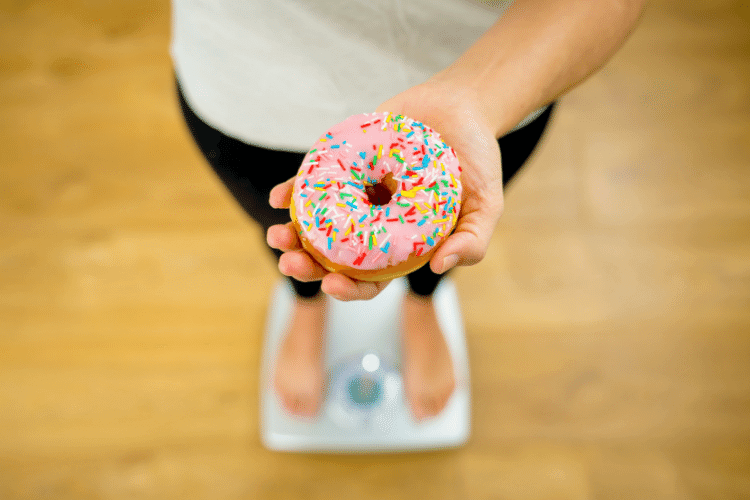Jump to this episode’s show notes now.
Sometimes it’s really, really difficult to keep our weight-loss motivation high when results are slow and troubles are quick to be found.
It plays out like Groundhog Day…
You wake up in the morning and your mind is set like superglue. Today, you’re going to adhere to your healthy eating plan–no matter what.
But mid-afternoon rolls around, and you’re emptying out your kiddos’ lunch boxes.
Sandwich crust ✔️
Apple core ✔️
Leftover cookies…
You justify trying just a teeniest little bite, but then (suddenly!) you find yourself having eaten one. Or more. The day is officially blown and your motivation to lose weight is about as reliable as a wet noodle.
Every good decision you made thus far feels like a distant memory, and it seems like your only option is to keep eating. You decide that tomorrow you’re going to do better, but today, all bets are off. You’d better eat all those tasty treats now because come midnight, they’ll be no more.

This is a scene that played out in my life hundreds of times. No exaggeration.
In hindsight, I now see that there were three things happening behind the scenes that really made my weight-loss motivation low and my struggles high.
Your Weight-Loss Motivation is Missing Because:
1. You Have The All-or-Nothing Diet Mentality.
This first reason we have no motivation to lose weight is also called the diet mentality. It’s a plague that follows us around and makes healthy changes really difficult. It’s all or nothing, black or white. You’re either eating perfectly or you throw caution to the wind and eat whatever you want, whenever you want.
When this happens, we’ve lost connection with what it means to make small, sustainable changes. And because we’re never going to eat perfectly (we’re never going to be “all”)–we end up doing “nothing.” All the time.
When you get in that cycle, it’s hard to have hope to change, since every day feels like a massive failure because you’re trying to do too much.
What’s The Solution to the Diet Mentality?
Pull it back a little bit. Be realistic about the changes that you can make in your life.
What is possible?
What is likely?
What is desirable?
It’s okay to do things that you want to do (read that again). It doesn’t have to be like going to the dentist or the lady doctor every time you make a healthy diet change.

2. You’re Dieting Too Hard.
You may leave the all-or-nothing eating behind you, but you might still have unrealistic expectations about what you’re actually able to accomplish.
You forget the fact that you’re raising kids, running a household, working in ministry, being a wife, a sister, and friend.
You may legitimately not have time to work out for an hour a day. Setting up your expectation to do so is only going to make you feel like a failure. People who feel like failures have very low weight-loss motivation. The solution to this problem is to step back once again, and see what is realistic–what is possible.
What can you do? And not only do, but rock? <– That is where you want to start.
When you consider the healthy changes that you want to focus on this next week, ask yourself, “On a scale of 1 to 10, how confident am I that one week from now I will have nailed it?”
If you’re anything less than an eight, you need to go back and adjust.
Now, I know that sounds really unmotivating to focus on something super small. But there’s nothing better than setting a goal, even if it’s small, and attaining it.
You’re training yourself to be successful. You’re building confidence in your ability to change. Yes, it’s small, but imagine if you made a small change every week for the next 12 weeks. In 12 weeks you’ll probably have 12 more healthy changes than if you tried to accomplish it all at once.
Focus in. Think about that “1% better” that you can do today. Put your effort there and let the rest go, because you’re going to work on it another time.
3. Your Weight-Loss Goals Aren’t All That Meaningful To You.
I’m assuming you’re a deep woman. You have deep values. You love the Lord and you know what is important in your life…family, friends, relationships, faith, and the well-being of others around you.
You don’t judge people by their weight, by how clear their skin is, or whether or not every hair is in place. You know that an individual’s value is way deeper than that. And yet, these are the very standards that you hold for yourself.
You pick yourself apart. For how you look and how you eat.
Sometimes you’re faced with a desire to eat for comfort or stress.
Maybe…
…you had a really hard day.
…you’re in a season of loss.
…a friend or child is hurting.
In these moments where your true emotions and values are revealed, your weight-loss goals are tossed to the side because, at that moment, you don’t care all that much.
The Importance of Having Goals That Matter
It’s important to choose goals and accomplishments that we actually care about.
Yes, you want to lose weight. You want to be healthy. You want to get dressed in the morning without anxiety. These things are important to you.
But if those are your only goals, they don’t have a leg to stand on faced with difficult temptations.
The solution to this is to dig deep.
Why do you want to lose weight?
Why is losing weight important to you?
What will losing weight and “getting healthy” allow you to do in your life?
When you accomplish these things, how will you feel?
It’s not so much about slipping on the jeans. It’s about going out and changing other people’s lives. These are the weight-loss motivations that’ll stand up against the temporary and immediate satisfaction that comes from indulging our flesh.

How to Find Weight-Loss Motivation
Let’s review 3 big barriers to weight-loss motivation and what you can do to kick ’em to the curb.
1. Keep an Eye Out for All-or-Nothing Thinking.
You have a little slip but it feels like you’ve blown it for good, and you’re tempted to throw it all away.
Don’t go “there.”
Weight-loss motivation comes back quickly when you hit the reset button and you remind yourself that this choice matters.
And, nothing gets things back on track faster than saying no to temptation. Even if you feel like you ate the farm. Making the next right choice can turn you back around, lickety-split.
2. Stop Trying to Do Too Much.
Let’s be realistic, friend, by choosing to make changes that fit into your life. You may have no motivation to lose weight because you’re just trying too hard.
You wouldn’t set your child up for failure by putting them in a calculus class when they were struggling in geometry. Don’t do the same to you. Take an honest assessment and get yourself focused on what’s possible, and then…rock that change!
3. Only Pursue What You Care About.
Finally, dig in and find your values that matter. A lot. Find a reason to get up, to get your sneakers on, to steam that broccoli. These changes can go way, way beyond the scale if you use them to glorify God.
Losing weight is fine, but when that’s your only motivation, it’s hard to keep going.
By giving yourself permission to skip the less important things, you’ll have more time and energy to pursue that which does!
As we’ve seen, faltering weight-loss motivation has less do with your efforts and more to do with the lingering diet side effects. The solution is not to try harder, but to seek first the Kingdom of God and His righteousness and then the rest will fall into place according to His perfect (but often peculiar) plan.
Podcast episode show notes:
Sometimes it’s really, really difficult to keep your motivation high when results are slow and troubles are quick to be found.
So today, let’s talk about the three things happening behind the scenes that are making your weight-loss motivation low and your struggles high.
Links mentioned:
- Prayer for Weight Loss Toolkit
- For a deep dive, check out Grace Filled Plate Platinum and be sure to get on the waiting list.
You may also love:
Get a FREEBIE:
- Get your FREE Faith [is greater than] Food Email Course.
Rather watch? Catch the video on YouTube.
Brandice Lardner is a Certified Personal Trainer, Nutrition Coach, Amazon #1 Best Selling Author, Homeschool Mom, and Jesus Girl whose mission in life is to help women ditch the diet mentality and find peace with food and their bodies so that they are better equipped to do the great things God has called them to do.





Leave a Reply